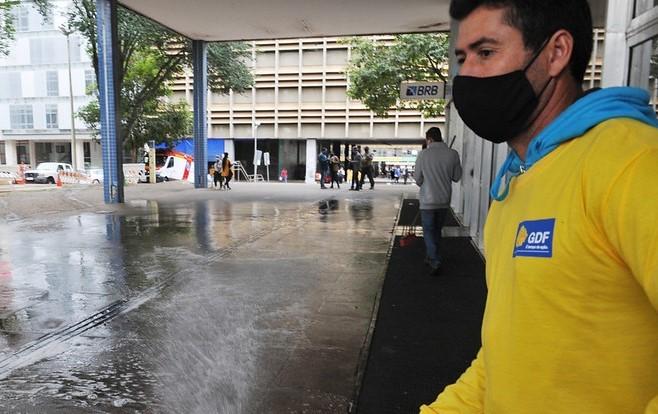In the latest global COVID-19 developments, Beijing's outbreak grew by 21 more cases and illness levels continued to rise in Latin America and the Middle East.
The global total today climbed to 8,410,682 cases, along with 450,835 deaths, according to the Johns Hopkins online dashboard.
Beijing total grows by 21 cases
An outbreak centered around a large wholesale food market in Beijing has 21 more cases, according to a daily update from China's National Health Commission. So far, 158 cases have been reported, and related illnesses have been reported in at least four other provinces, including Hebei, where two more reported today, apparently involving traders from the market, CNN reported.
The event has triggered widespread testing in Beijing, along with the reintroduction of targeted response measures. Health officials are closely watching the event to see if it sparks a second wave in China and to learn more about the conditions that led to the flare-up.
At a briefing today, Chinese officials said the market's trading sections for meat and seafood had the highest virus contamination levels and noted that the lower temperature and high humidity in those areas may have been contributing factors, Reuters reported.
China today also reported a case from the city of Tianjin involving a hotel restaurant dishwasher who had no recent travel history or contact with any known cases, CNN reported.
More impacts in Latin America
In Latin America, one of the current global hot spots, Chilean health officials said yesterday that it will reintroduce some of its COVID-19 restrictions, as cases climbed past 200,000, the Washington Post reported. The country recently reported 31,000 backlogged cases.
The country ordered an early lockdown, which initially kept cases low, but the virus is spreading in crowded, low-income, urban areas. In Santiago, the country's capital, residents can leave their homes only twice a week.
In Peru, oxygen plants have been out of service for years, and the country faces a daily oxygen shortfall of 180 tons, leaving families to seek overpriced oxygen tanks for their sick loved ones on the black market, the Washington Post reported. The country's health minister introduced a $28 million package to import oxygen and build new plants and has called on lawmakers to criminalize medical supply speculation and hoarding.
In other developments, a survey about COVID-19 related interruptions in noncommunicable disease services in May by the Pan American Health Organization (PAHO) found that 18 of 28 countries have partial disruptions and 2 have complete disruptions. The impact was greatest for diabetes, hypertension, dental care, and rehabilitation services. Reasons included elective care service cancellation, staff reassigned for COVID-19 response, and patients not presenting for care.
However, the survey found that most countries have found alternative strategies for delivering care to the most vulnerable people, with 61% using telemedicine.
Saudi cases surge; Hajj in limbo
In the Middle East, Saudi Arabia is experience a surge of cases after it started easing lockdown measures in late May, and since June 1, COVID-19 cases have doubled each day, CBS News reported. Yesterday the health ministry reported a daily record high of 4,919 cases.
Health officials have reinstated a lockdown for Jeddah and signaled the possibility of a similar order for Riyadh. Earlier this week, the health minister said the spike was mainly related to people not following precautions and social distancing guidelines during Ramadan. As for some other Middle East countries, outbreaks in crowded migrant worker communities are fueling transmission.
So far, Saudi officials haven't said it they will allow the Hajj pilgrimage, scheduled for the end of July, to take place. Four countries are already barring their citizens from traveling to Saudi Arabia for the Hajj.
In Egypt, Amnesty International today said the country's authorities must stop harassing and intimidating frontline health workers who air safety concerns or criticize the government's handling of the COVID-19 epidemic.
In a statement, it said it documented instances of Egyptian authorities using broad or overly vague charges of "spreading false news" and "terrorism" to arbitrarily arrest and detain healthcare workers who speak out. It added that health workers have raised concerns about unsafe working conditions, personal protective equipment shortages, inadequate infection control training, limited testing of medical staff, and lack of access to basic health care.
In investigating the claims, Amnesty International interviewed 14 doctors, relatives, lawyers, and syndicate members, and examined supporting evidence, including written correspondence and voice messages from public officials.
Russia cases stabilize; country braces for 2nd wave
Russia today reported its lowest daily total since May 1, with 7,790 new cases for a national total of 561,091, Reuters reported. The country's health officials also said they are preparing for a second wave of pandemic activity in the fall.
The country has been steadily lifting lockdown measures, and in Moscow, one of the country's main hot spots, people were allowed to return to museums and restaurant terraces for the first time in 2 months. The city is preparing to host a military parade on June 24.
In other developments:
- Kazakhstan beefed up its COVID-19 restrictions amid news that former President Nursultan Nazarbayev has tested positive for the virus, Reuters reported.
- English Premier League soccer resumed yesterday after a 100-day lapse with no fans and with players observing a moment of silence for people who died from COVID-19 and taking a knee to support the Black Lives Matter movement, CNN noted.





















